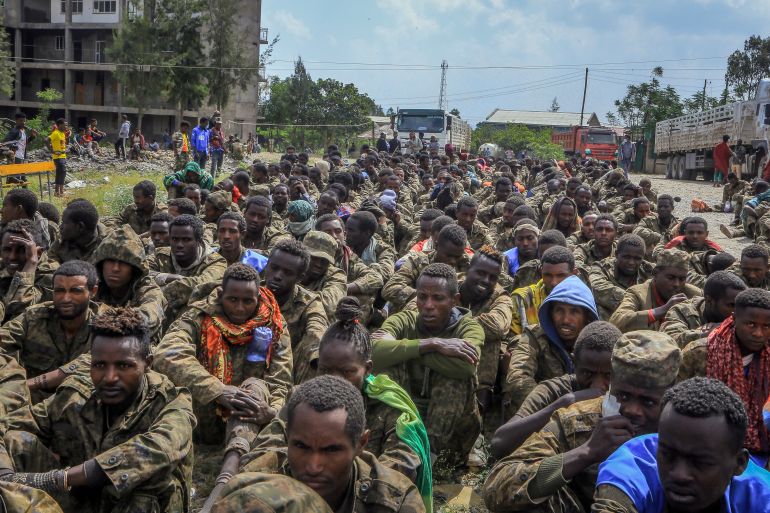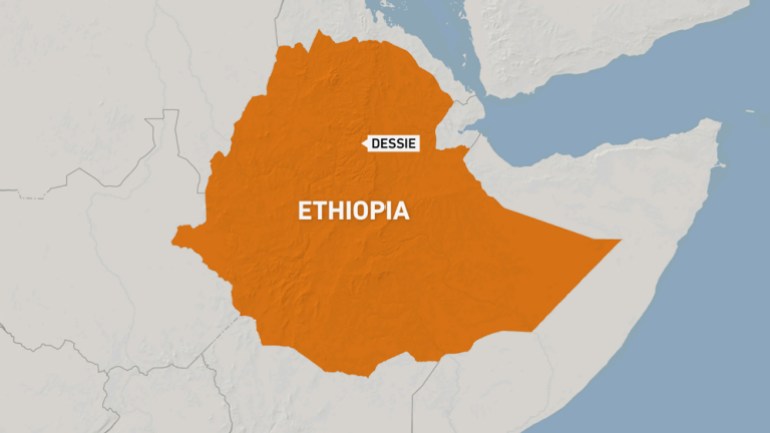Ethiopia’s strategic town of Dessie ‘captured’ by rebel forces
Ethiopia government spokesperson, however, denies Tigrayan fighters seized Dessie in the Amhara region, saying the town was still under government control.

Tigrayan forces said they captured the strategic town of Dessie in Amhara region that borders Tigray, according to a rebel spokesman and residents.
An Ethiopia government spokesperson, however, denied Tigrayan fighters seized Dessie, saying the town was still under government control.
Keep reading
list of 4 itemsTigray mothers share shocking accounts of dire famine conditions
UN warns of ‘unprecedented’ malnutrition in Ethiopia’s Tigray
UN suspends all flights to Tigray amid Ethiopian air raids
Residents told AFP news agency that government troops retreated on Saturday following heavy fighting and power outages in parts of the town.
“At around 2am [23:00 GMT] Friday, Ethiopian soldiers began retreating from the area,” Amir, a Dessie resident who declined to give his second name, said.
Another resident said Tigrayan rebels “entered the city with ENDF [Ethiopian National Defense Force] soldiers not seen” anywhere in the city.
Getachew Reda, spokesperson for the Tigray People’s Liberation Front (TPLF), told Reuters news agency by satellite phone from an undisclosed location that Tigrayan fighters pushed government forces from Dessie and were headed towards the town of Kombolcha.
He added the fighters captured numerous Ethiopian soldiers.
The TPLF’s account of developments could not be independently verified and phone lines in Dessie appeared to be down as of Saturday afternoon. Much of northern Ethiopia is under a communications blackout and access for journalists is restricted, making battlefield claims difficult to corroborate.
‘Fabricated propaganda’
Legesse Tulu, the government spokesperson, said in a text message the town was still under the control of the Ethiopian government, adding claims by Tigrayan forces were “fabricated propaganda”.
The capture of Dessie would be a strategic gain for Tigrayan fighters against central government forces trying to dislodge them from the Amhara region. Tens of thousands of ethnic Amharas have also sought refuge there from an escalation in fighting.
The large town is 385km (240 miles) from the capital, Addis Ababa, and is the furthest south in Amhara that the TPLF has reached since pushing into the region in July.
Samuel Getachew, an independent journalist based in Sodo, Ethiopia, said the capture of Dessie would mark a significant gain for rebel forces in the Amhara region.
“It’s an important city and people are really under siege, they’re just waiting for what’s going to happen to them,” Getachew told Al Jazeera. “There was a warning from the leadership of the TPLF that they were coming to Dessie – and here they are.”

International censure
The United States called on Tigrayan rebels to withdraw from the Amhara and Afar regions with a statement from the State Department urging the TPLF to “halt its advances in and around the cities of Dessie and Kombolcha”.
“We urge the TPLF not to use artillery against cities and recall our strong objections to the ENDF air strikes in Mekelle and other areas of Tigray which have cost countless lives,” State Department spokesperson Ned Price said in the statement.
“There is no military solution to this conflict, and all parties must begin ceasefire negotiations without preconditions.”
The Tigray region, meanwhile, has faced near-daily aerial bombardments since last week as the military steps up its use of air power in the war.
According to a hospital official, 10 people died in an air strike on Thursday, while the UN said two strikes on the Tigrayan capital Mekelle on October 18 killed three children. Another person died in a separate attack this month.
The government said the facilities bombed in northern and western Tigray were military in nature and aiding the TPLF.
The bombings have drawn international censure, and disrupted UN access to the region where an estimated 400,000 people face famine-like conditions under a de-facto aid blockade.
Control of the skies, along with superior manpower, is one of the few remaining areas where the federal government holds a military advantage over the rebels.
The conflict erupted last November after Prime Minister Abiy Ahmed sent troops to topple the TPLF.
The 2019 Nobel Peace Prize laureate said the move came in response to TPLF attacks on army camps and promised a swift victory.
Tigrayan forces were initially beaten but recaptured most of the region in July and pushed into the neighbouring Amhara and Afar regions.
Thousands of people have been killed and more than two million people have been forced to flee.
In mid-October, the Tigrayan forces said the military launched a ground offensive to push them out of Amhara. The military said on Thursday there was heavy fighting there, but accused the Tigrayan forces of starting it.